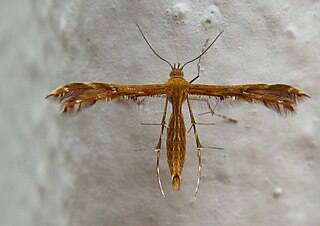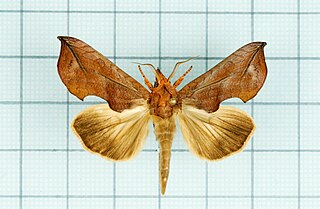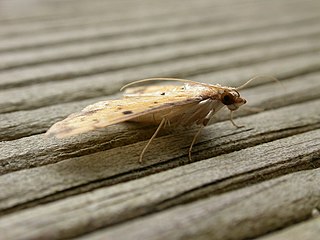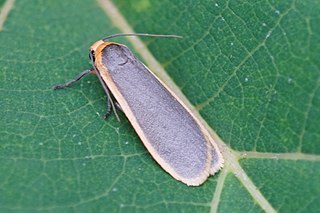
Honeysuckles are arching shrubs or twining vines in the genus Lonicera of the family Caprifoliaceae, native to northern latitudes in North America and Eurasia. Approximately 180 species of honeysuckle have been identified in both continents. Widely known species include Lonicera periclymenum, Lonicera japonica and Lonicera sempervirens. L. japonica is a highly invasive species considered a significant pest on parts of North America, Europe, South America, Australia, and Africa.

Camellia japonica, known as common camellia, or Japanese camellia, is a species of Camellia, a flowering plant genus in the family Theaceae. There are thousands of cultivars of C. japonica in cultivation, with many colors and forms of flowers. In the U.S. it is sometimes called japonica. In the wild, it is found in mainland China, Taiwan, southern Korea and southwestern Japan. It grows in forests, at altitudes of around 300–1,100 metres (980–3,600 ft).

Herpetogramma is a genus of moths in the family Crambidae described by Julius Lederer in 1863. It currently comprises 106 species that are found in North America, Eurasia, Australia, New Zealand, Central and South America. Of the few species where host plants are known, the larvae mostly feed on grasses.
Sinarella is a genus of moths of the family Erebidae. The genus was erected by Felix Bryk in 1949.

Hellinsia lienigianus is a moth of the family Pterophoridae which inhabits coastal areas, dry pastures and waste ground and is found in Africa, Asia, Australia and Europe. Also known as the mugwort plume it was first described by Philipp Christoph Zeller in 1852.
Nippoptilia cinctipedalis is a moth of the family Pterophoridae. It is found in Australia, Korea, Japan (Kyushu), China, Micronesia, the Republic of Palau and Vietnam.

Herpetogramma licarsisalis, commonly known as the grass webworm or pale sod-webworm, is a species of moth in the family Crambidae.

Nippoptilia vitis is a moth of the family Pterophoridae, that is known from Japan, Korea, Taiwan, China and Thailand.

Stenodacma wahlbergi is a moth of the family Pterophoridae described by Philipp Christoph Zeller in 1851. It is known from Japan, China, Saudi Arabia, Iran, Sri Lanka, India, Central, East and South Africa, St. Helena, Mauritius, the Seychelles and Rodrigues. It has recently been recorded from Vietnam. Records for Australia were based on synonymisation with Stenodacma pyrrhodes.
Pselnophorus vilis is a moth of the family Pterophoridae. It known from Japan, Amur, Korea and China.
Macarostola japonica is a species of moth of the family Gracillariidae. It is native to Japan.
Caloptilia theivora is a moth of the family Gracillariidae. It is known from Brunei, China, Hong Kong, India, Indonesia (Java), Japan, Korea, Malaysia, Sri Lanka, Taiwan, Thailand and Vietnam.

Oraesia excavata is a species of moth of the family Erebidae first described by Arthur Gardiner Butler in 1878. It is found in Japan, Korea, China, Thailand and Taiwan and has recently been recorded from Hawaii.

Herpetogramma cynaralis is a species of moth of the family Crambidae. It is found in Japan, Sri Lanka, Indonesia and Australia, where it has been recorded from New South Wales and Queensland.
Hydrelia nisaria is a moth in the family Geometridae first described by Hugo Theodor Christoph in 1881. It is found in the Russian Far East, China, Japan and Korea.

Manulea japonica is a moth of the family Erebidae. It is found on the Kuril Islands (Kunashir) and in China, Korea and Japan. It has a wingspan of 25–30 mm.

Elophila turbata is a moth in the family Crambidae found in Africa and Asia. It was first described by the English entomologist Arthur Gardiner Butler in 1881 from a specimen found in Yokohama, Japan.

Pandemis dumetana is a species of moth of the family Tortricidae. It is found in China, South Korea, Japan, Russia, northern India, almost all of Europe, Asia Minor, Iran, southern Siberia and Transcaucasia. The habitat consists of woodlands, fruit farms, orchards and gardens.

Herpetogramma rudis is a species of moth in the family Crambidae. It was described by Warren in 1892. It is found in China, Japan, Tibet, Korea and India.
Helcystogramma triannulella is a moth in the family Gelechiidae. It was described by Gottlieb August Wilhelm Herrich-Schäffer in 1854. It is found in south-western and south-eastern Siberia, the Caucasus, Transcaucasia, Kazakhstan, Korea, Japan, China, northern India and large parts of Europe, except Ireland, Great Britain, the Netherlands, Denmark, Scandinavia, the Baltic region and the western Balkan Peninsula.













